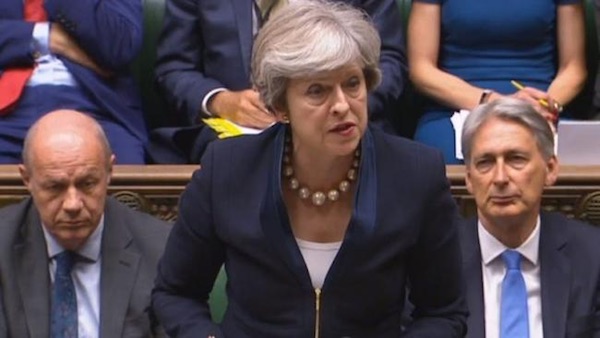
A belligerent British government statement, apparently ruling out a role for the 26 County government in the running of the Six Counties, has cast a shadow over efforts to restart powersharing talks in Belfast.
Dublin’s Minister of Foreign Affairs Simon Coveney had said that full direct rule from London could not be reimposed without the input of the 26 County government.
Under both the Good Friday and St Andrews’ peace agreements, the British government is under a legal obligation to consult Dublin if power-sharing in the North fails to function. The DUP/SF Executive in Belfast has not met for seven months after the late Martin McGuinness resigned as deputy first minister in a row over a financial scandal and unimplemented previous agreements.
“There can be no British-only direct rule, that is the Irish Government’s position,” Mr Coveney said. “It would be very difficult to even contemplate how direct rule would function in that context.”
However, within hours of his statement the British government issued a terse retort, saying: “We will never countenance any arrangement, such as joint authority, inconsistent with the principle of consent in the agreement.’’
In an ominous sign for ongoing talks efforts, it appears the DUP influenced the British decision to issue a statement rebuking Coveney.
Senior Sinn Fein representative Alex Maskey said the British intervention represented a “slapdown” for the Dublin government’s position.
Sinn Fein’s leader at Stormont, Michelle O’Neill criticised the British government’s statement on power-sharing. She said both governments are “co-equal”.
“They have a joint and equal role in the process, in safeguarding rights and implementing the agreements,” she said.
“The Irish government must assert that role and the British government acknowledge that they are partners in that process.”
The SF leader in the North added that the 2006 St Andrews Agreement had ended the British government’s ability to suspend the institutions and impose direct rule.
“It also committed in the event of no agreement to a new British-Irish partnership to implement the Good Friday Agreement,” she said.
SDLP leader Colum Eastwood said unilateral British direct rule would amount to “joint Tory-DUP direct rule” and undermine the principles of the Good Friday Agreement.
“The rapid and extreme response to Minister Coveney’s reasoned statement bears all the hallmarks of a British government politically controlled by the DUP,” he said.
“The SDLP are clear that our first choice has always been and will always be restoring our devolved institutions. We believe that local decisions on behalf of local people are best made by our local institutions.”
South Armagh-born Labour MP Conor McGinn accused the British government of overreacting to Mr Coveney’s “matter-of-fact remarks”
He also claimed it was the latest indication that the DUP was “calling the Tory tune”.
“The Irish government has a legitimate and constitutionally enshrined role to play in the north as a co-guarantor of the Good Friday Agreement,” he said.
‘READY FOR TALKS’
Last week, a DUP proposal to bring back the northern Executive straight away while discussing culture and corruption issues in a “parallel process” was dismissed by Sinn Fein.
However, Sinn Fein’s leader at Stormont, Michelle O’Neill, said Sinn Fein is ready to restart formal negotiations with the DUP, other parties and the two governments.
Ms O’Neill said: “The Sinn Fein and DUP leaderships have for more than a week now been engaged in intensified dialogue to determine whether political progress is possible.
“We do believe progress is possible and are therefore ready to re-engage in formal negotiations together, and with the other parties and both governments, to try and reach agreement in a short, sharp and focused negotiation.
“This process should begin immediately.”
![[Irish Republican News]](https://republican-news.org/graphics/title_gifs/rn.gif)
![[Irish Republican News]](https://republican-news.org/graphics/title_gifs/harp.gif)

